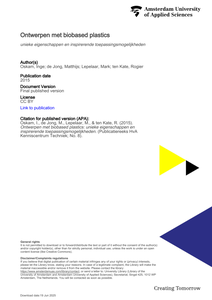In the housing market enormous challenges exist for the retrofitting of existing housing in combination with the ambition to realize new environmentally friendly and affordable dwellings. Bio-based building materials offer the possibility to use renewable resources in building and construction. The efficient use of bio-based building materials is desirable due to several potential advantages related to environmental and economic aspects e.g. CO2 fixation and additional value. The potential biodegradability of biomaterials however demands also in-novative solutions to avoid e.g. the use of environmental harmful substances. It is essential to use balanced technological solutions, which consider aspects like service life or technical per-formance as well as environmental aspects. Circular economy and biodiversity also play an im-portant role in these concepts and potential production chains. Other questions arise considering the interaction with other large biomass users e.g. food production. What will be the impact if we use more bio-based building materials with regard to biodiversity and resource availability? Does this create opportunities or risks for the increasing use of bio-based building materials or does intelligent use of biomass in building materials offer the possibility to apply still unused (bio) resources and use them as a carbon sink? Potential routes of intelligent usage of biomass as well as potential risks and disadvantages are highlighted and discussed in relation to resource efficiency and decoupling concept(s).
DOCUMENT

‘Ontwerpen met biobased plastics’ is de eindpublicatie van het project “Design Challenges with Biobased Plastics”. In dit onderzoeksproject deed de HvA, samen met diverse mkb-bedrijven onderzoek naar de kennis een tools die ontwerpers nodig hebben om biobased plastics, kunststoffen van hernieuwbare materialen, toe te passen. De publicatie gaat in op de kansen die biobased plastics bieden en biedt praktische tools, inspirerende voorbeelden en handreikingen die het ontwerpen met deze materialen makkelijker maken.
DOCUMENT

Om de toepassing van biobased plastics te stimuleren is een belangrijke rol weggelegd voor ontwerpers. Omdat zowel gevestigdeontwerpers als studenten weinig tot geen kennis hebben van biobased plastics, doet de Hogeschool van Amsterdam (HvA) onderzoek naar verschillende aspecten van ontwerpen met biobased plastics.
MULTIFILE

In het project Circulaire Biopolymerenwaardeketens voor PHA en cellulose wil men naar afbreekbare en biogebaseerde plastics, producten en afzetmarkten toe. Kansloos als die nieuwe plastics moeten gaan concurreren met oliegebaseerde plastics die al in grote hoeveelheden worden geproduceerd; kansrijk als die plastics toegevoegde waarde bieden en het productieproces ervan een hoge theoretische en praktische opbrengst heeft.
LINK
Worldwide, plastic cups are used for serving drinks. Some typical examples of large-scale consumption are large concerts and festivals. As a part of the BIOCAS project, which focusses on the valorization of biomass through various routes, a PHA biobased festival cup was developed and created to reduce the impact of current fossil plastics. The role of VHL was to assess the environmental impact. The aim of the report is to inform the BIOCAS-partners about the use of plastic cups, and address the environmental impact in comparison with other types of biobased plastic cups and fossil-based cups. This report can serve as a basis for making choices within all different types of (plastic/biobased) cups. Besides, it can be used as a public communication tool about the environmental impact of different types of (plastic/biobased) cup applications.
DOCUMENT

Dit boekje is een weerslag van de inaugurele rede als Lector Biobased Economy bij Hogeschool Van Hall Larenstein die Hans Derksen op 8 mei 2012 hield. De kern van het betoog is wat de biobased economy kan betekenen voor een duurzame samenleving. Maar ook wat deze niet kan betekenen, want biomassa is niet de oplossing voor alles. Uiteindelijk gaat het vooral over de kansen die biomassa, en meer in het bijzonder een biobased economy, de mens biedt.
DOCUMENT

In dit document staat het programma van het Minisymposium grasvalorisatie en - vermarkting, en ook een plan van aanpak waarin partijen worden voorgesteld en wat de insteek is achter de samenwerkingsverbanden. Want dit congres is voortgekomen uit een samenwerkingsverband tussen het lectoraat Duurzaam Cooperatief Ondernemen, het kenniscentrum Biobased Economy, het lectoraat van Andre Heeres en de leerstoel van prof dr. E. Heeres van de RUG.
DOCUMENT

Het coronavirus heeft tot nu toe wereldwijd ongeveer 1,8 miljoen slachtoffersgeëist. De klimaatverandering leidt mogelijk deze eeuw tot ongeveer 9,3miljoen doden per jaar. Om dat te voorkomen is een verandering van onseconomische denken nodig, stelt Egbert Dommerholt, lector biobased business valorization aan de Hanzehogeschool Groningen.
DOCUMENT

Zeven aanbevelingen voor de publieke professional om - vanwege hun rol in de circulaire economie - meer te doen met binnenhavens.
LINK